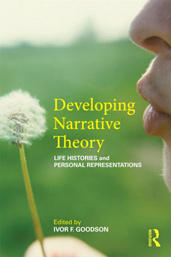Developing Narrative Theory: life histories and personal representation
Narrativity, Learning and Flexibility: towards the narrative future
In a way, the spectrum from description to elaboration covers a range from a more factual, vernacular narration of the world to a more theoretical or reflexive view. Richard Hoggart has written autobiographically about this impulse, which he sees as the capacity to theorize his life and imagine it differently. He describes this as a phenomenon in relation to the class-based society in which he grew up:
Almost all working class people have been used to living as if subject to merely successive events. If the assault has a pattern it is that of birth and growth and death, it is that of seasons and main dates of the year and of the weekly wage packet. Working class life has long been dominated by the thisness of things and events and people; an unordered thisness.
What almost all working-class life – almost all levels of life – avoids or, better, is unaware of, is intellectual pattern-making, generalising across and about habits in space and time, and so of gathering such generalisations together and hazarding judgments …. To generalise about them is strange and can be disconcerting. (Hoggart 1990: 213–214)
Hoggart’s own life story is wonderfully elaborated and he has written of his capacity to theorize his life to see it in context and in our terms to locate it. Above all, in reference to his characterization of working-class life he sees his exceptionality as ‘a push for meaning outside the day to day’ (ibid.: 89), a capacity to theorize his own life.
This capacity to ‘theorize’ and ‘locate’ our life story may provide a highly developed resource for responding flexibly to life events. Given the current demand for ‘flexible’ skills and ‘flexible’ labour, and given the potency and fluency of what Bauman calls ‘liquid modernity’, this narrative capacity may be of considerable import in the social conditions and relations emerging under globalization in late modernity. Bauman characterizes the contemporary scene in this way:
An unprecedented fluidity, fragility and in-built transience (the famed ‘flexibility’) mark all sorts of social bonds which but a few dozen years ago combined into a durable, reliable framework inside which a web of human interactions could be securely woven. They affect particularly, and perhaps most seminally, employment and professional relations. With skills falling out of demand in less time than it takes to acquire and master them, with educational credentials losing value against their cost of purchase by the year or even turning into ‘negative equity’ long before their allegedly lifelong ‘sell-by’ date, with places of work disappearing with little or no warning, and with the course of life sliced into a series of ever shorter one-off projects, life prospects look increasingly like the haphazard convolutions of smart rockets in search of elusive, ephemeral and restless targets, rather than a predesigned and predetermined, predictable trajectory of a ballistic missile. (Bauman 2003: 91)
